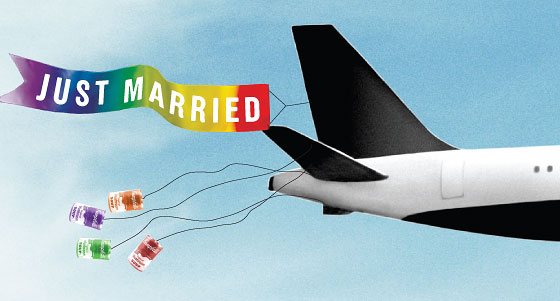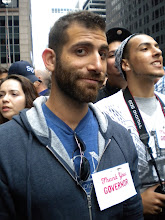My friend Jay Blotcher whom I plan to see The Cockettes with on Monday hipped me to the these three wowing queer perspectives on same sex marriage issue. Articles are from The Washington Post, New York Magazine, Alternet & Bilerico Project. The day we tied the knot, three years ago, City Hall was crowded with brides and grooms waiting their turn in the municipal chapel. But we, two grooms, were there for a domestic partnership, and our only officiant was the brusque woman who took our money. I called us “as married as gays can be in New York,” and at the time, it was true. Later, I recount our vague nuptials for a friend. “So basically,” she replied, “it’s like getting a parking permit.” Well, yes. But now things are looking better here—thanks to the California Supreme Court. Although New York’s top court, the Court of Appeals, ruled against same-sex marriages in 2006, three months ago, an appellate court in western New York said that New York State must respect valid marriages performed elsewhere. On May 6, the Court of Appeals let that ruling stand, meaning current law says that while I can’t get married in New York, if I get married someplace else, it’s binding here. Canada, Spain, Belgium, and Holland will all let me get married, except that other than Canada, those countries require residency for a marriage to be valid. And Massachusetts quickly tightened its 2004 welcome policy, dredging up an old law stating that if you can’t get married legally in your state, you can’t do it in theirs. It’s a great little trick: New York will honor my Spanish, Belgian, Dutch, or Bostonian wedding, but Spain, Belgium, Holland, and Boston will only let me be legally married if I live there, not in New York. But California has no residency requirement. I can live here, get married there, and still have it count when I land at JFK. This will mean more travel for Jay Blotcher. He and his partner, Brook Garrett, got a domestic partnership at City Hall in 2000. Then they were civilly united on a hillside in Vermont during the foliage season that year—a step up from the grotty City Hall registration but carrying no weight on this side of Lake Champlain. Their last wedding was in New Paltz, where their participation in Mayor Jason West’s mass-marriage event of 2004 got them on CNN but no more formally wed. “It’s a marriage marathon,” says Blotcher. “And California is next.” Blotcher and Garrett are planning a trip to Santa Monica for sometime after June 14, when the California ruling takes effect. But Alan Van Capelle, executive director of Empire State Pride Agenda, is still going to wait for a legal New York wedding, which he thinks could happen within a year. “It’s terrific they’re doing it in California,” Van Capelle says. “But I love this state so much, I think it owes me a marriage license.” I’m with him. And a parking permit would be nice, too.
Activists: Something Lost In Fight for Gay Marriage
By Michael Powell
Washington Post Staff Writer
Wednesday, March 31, 2004; Page A03
NEW YORK -- Some days, as he watches gay men button their tuxes and lesbians slip into wedding gowns, gay rights activist William Dobbs feels like screaming.
"Some gay activist in California called for mass civil disobedience until we get the right to marry," Dobbs said, his voice growing louder. "God! What could be more dreary?"
Dobbs has marched on the front lines of the gay liberation movement for three decades, and has not a closeted bone in his body. He has been arrested and spat on. But he never imagined his battles for sexual liberation would shore up the most conservative of social institutions: marriage.
"Our movement has become about lusting for weddings and lavender picket fences," he said. "It's so embarrassing -- I feel like turning in my gay card."
The gay rights activists and theorists and feminists who critique the campaign from the left are the voices less often heard in the battle over gay marriage. These critics are not opposed to gay marriage -- none would deny the emotional tug of marriage for tens of thousands of gay couples. But they are mortified at the fate of a revolution pasteurized. They wonder what happened to championing sexual freedom and universal health care, and upending patriarchy?
As the gay revolution moves from leather bars and ACT UP sit-ins to the marriage registry at Bed Bath & Beyond, the middle-class makeover can be disorienting. Jim Eigo, a radical gay rights activist, framed the dilemma a few years back: "What's the use of being queer if you can't be different?"
James Wagner, 63, a bearded, retired insurance executive and longtime gay rights activist, rode the subway from his apartment in the Chelsea neighborhood of Manhattan down to City Hall a week back to wave a placard at a rally for gay marriage. He watched couples yearning to exchange vows, and he was undeniably moved -- and deeply uneasy.
"I thought to myself: 'This is right. This should be their right to express their love as they like,' " Wagner said from his apartment, which he shares with his partner of 12 years. "But marriage is the way that government exerts social control. I'm uncomfortable supporting it. I'm interested in changing society, not assimilation."
Against such arguments, however, falls the weight of political reality.
When the Massachusetts Supreme Judicial Court ruled in favor of gay marriage, and President Bush voiced support for a proposed constitutional amendment barring such marriages, the battle lines joined. As rank-and-file gay couples descended by the thousands on city halls in San Francisco; New Paltz, N.Y.; and Portland, Ore., to take their marriage vows and toss bouquets into the air, the leaders could trot into the chapel after them -- or get out of their way.
"There is the shock of finding ourselves arguing for something that the gay revolution was an attack on," said the Pulitzer Prize-winning writer Tony Kushner, whose play "Homebody/Kabul" is being performed in the District. "But enfranchisement of citizens is an enormous part of what we struggled for when we took to the streets 35 years ago."
Richard Goldstein, an executive editor of the Village Voice, has a partner of 24 years. Like many of his out-of-the-closet-and-into-the-streets 1960s contemporaries, he harbors no deep desire to get hitched. But he insists that this should be his decision, not the government's.
"A lot of gay people grew up wanting middle-class lives, including marriage and children," Goldstein said. "They had to make a painful choice to acknowledge being gay and letting go all those hopes and desires. Now they realize they can have it all and that's very moving to watch."
The gay liberation movement came of age in the late 1960s as gay men and lesbians protested police brutality and the raids on their bars and public baths. Its ethos of sexual freedom and experimentation transformed a culture. The revolution's second act came in the 1980s, when AIDS descended. Militants formed ACT UP and their demands for more research and affordable medications led to support of universal health care and expanded legal rights.
But as doors opened, gays with more conservative cultural politics and desires stepped through. This is an old radical narrative. Left-wing labor organizers in the 1930s watched three decades later as unionized workers marched in support of the Vietnam War. Aging black liberationists watch the ascension of such conservatives as Secretary of State Colin L. Powell and national security adviser Condoleezza Rice.
"It's the tension between the liberationists and the assimilationists," said Alisa Solomon, a professor at New York's Baruch College and writer for the Village Voice. "Our side made it possible for more conservative gays to come out of the closet, and when they did they brought a more conservative politics and culture to our movement."
Solomon, like many gay rights activists, argues for redefining all marriages -- homosexual, heterosexual -- as civil unions. This would provide the legal protections that come with marriage, from health care to taxes to adoption, without the emotional and cultural freight. "The queer marriage movement needs a divestment campaign," Solomon wrote in the Village Voice. "The only way we will win is if the state's authority to pronounce is stripped from the ministers, rabbis, imams and priests."
But other ACT UP veterans argue for seizing the day. Jay Blotcher, who once served as the group's spokesman, drove from his Upstate New York home to New Paltz to marry his partner. He says gay rights activists should stop worrying and take credit for forcing the cultural opening that led to gay marriage.
"We'll breathe new life into marriage -- God knows it needs rejuvenation," he said. "We're here for the queer makeover."
For now, however, the gay establishment has taken a Hallmark Cards approach to the marriage campaign, framing it in middle-class terms. The Lambda Legal Defense and Education Fund's "Freedom to Marry" guide advises that gays are "very much like everyone else. They grow up, fall in love, form families . . . they mow their laws, shop for groceries."
Dobbs said he reads this stuff and thinks: What a yawn.
He leafed through the photos of the gay marriages these past weeks. There wasn't a nose-pierced, pink-haired, breast-tattooed transgressive transgender queen to be seen. He has a nightmare vision of what the future holds.
"We're going to just put the photo of our spouse on our desk at the law firm and represent some Fortune 500 corporation," Dobbs said. "We're not going to threaten to rearrange your finances or change your world in any way. That's not my gay movement."
Why One Queer Person Is Not Celebrating California's Historic Gay Marriage Decision
By Mattilda Bernstein Sycamore, AlterNet
Posted on May 28, 2008, Printed on May 28, 2008
http://www.alternet.org/story/86574/
Editor's Note: To read a different take on the California Supreme Court decision, read Greta Christina's story, Why I Fought for the Right to Say 'I Do'.
Though I am a queer person living in San Francisco, I will not be celebrating the California Supreme Court decision overturning the ban on same-sex marriage. Nor will I join those who say, "I would never choose to get married, but I think everyone should have the right." Sorry, honey -- marriage is depressing, period. That means gay marriage, too. And here's why.
Gay marriage does nothing to address fundamental problems of inequality. What is needed is universal access to basic necessities like housing, health care, food, and the benefits now obtained through citizenship (like the right to stay in this country). Legalized gay marriage means only that certain people in a specific type of long-term, monogamous relationship sanctioned by a state contract might be able to access benefits. While marriage could confer inclusion under a spouse's health-care policy, it does nothing to provide such a policy. Marriage might ensure hospital visitation rights, but not for anyone without a spouse. Marriage may allow for inheritance rights between spouses, but what if there is nothing to inherit?
For a long time, queers have married straight friends for citizenship or health care, but this has never been enshrined as "progress." The majority of queers -- single or coupled (but not desiring marriage), monogamous or polyamorous, jobless or marginally employed -- would remain excluded from the much-touted benefits of legalized gay marriage.
And let's not forget the history of marriage as a legal method for keeping property within specific dynasties (property that originally included women and slaves). In fact, marriage still exists as a central venue for spousal and child abuse -- there's a reason divorce is so popular, and suicide attempts among queer teens so prevalent. If social change is on the agenda, then the privileges associated with marriage need to be challenged, not embraced.
In fact, the push for gay marriage has shifted advocacy away from essential services like HIV education, AIDS health care, drug treatment, domestic violence prevention, and homeless care -- all crucial needs for far more queers than marriage could ever be. And this pattern will undoubtedly continue, as millions of dollars will be spent fighting an anti-gay marriage constitutional amendment proposed for the November ballot, at a time when social services are being scrapped across the country, and especially in California.
The spectacle around gay marriage draws attention away from critical issues -- like ending U.S. wars on Iraq and Afghanistan, stopping massive Immigration and Customs Enforcement (ICE) raids across the country, and challenging the never-ending assault on anyone living outside of conventional norms.
While many straight people are reaping the benefits of gay liberation and discovering new ways of loving, lusting for and caring for one another, the gay marriage movement is busy fighting for a 1950s model of white-picket fence "we're just like you" normalcy. And that's no reason to celebrate.
Editor's Note: For an opposing viewpoint, check out Greta Christina's article "Why I Fought for the Right to Say 'I Do'".
Mattilda Bernstein Sycamore is most recently the editor of an expanded second edition of That's Revolting! Queer Strategies for Resisting Assimilation (Soft Skull Press)
Thursday, May 29, 2008
Reciting Vows
Labels:
activism,
bilerico project,
gay marriage
Subscribe to:
Post Comments (Atom)



6 comments:
As a dear friend of mine, Bernie, has always said, "I wouldn't have gone through all of the trouble of coming out of the closet, if I wanted to pretend I was normal."
I can understand why people want to get married so that they can insure that they will be able to visit loved ones in the hospital and not get thrown out of their homes should one partner die. There are a lot of valid legal reasons for people to want to get married.
That said, I personally would rather eat ground glass. But maybe that's because of the shining example of married life put forth by my own dear parents.
I struggle with the assimilation piece and the feeling of wanting the same legal rights. It doesn't matter why you fight for it, but fighting for it is perhaps the most important thing ever. Whether you have fought for decades for the right for the identity to not be criminalized (Our ol' Stonewall warriors) or you are new to the movement and just want the right to live in the burbs with your partner - a victory is a victory. Those people that will get married, including the white picket fence inhabiters of the suburban stretches, will no doubt change minds. Their marriages and wedding registries will make people look at issues they have ignored. The ol' Stonewallers need not get depressed, it's still "in your face" --- just in a different way.
Jennifer Vanasco had an article in the Chicago Free Press this week. I wanted to share this quote:
And yet marriage is risky. That's why not everyone does it. It asks for a leap of faith, a commitment to loving and supporting someone you can never fully know. Half of all marriages fail. What other ventures do people dare to try with a 50-percent failure rate? Would you go to college if you knew that you were as likely to drop out as stay in? Get a job if you knew that there was an even chance you'd be fired?
Marriage is a risk. It is brave. When we fight for the right to marry, we are asking for a chance to be challenged. We are not taking the easy way out. We are saying that in spite of the odds, despite the larger possibility of failure, we are willing to live in hope.
Read the rest of the article...
I support anyone's right to be a "nose-pierced, pink-haired, breast-tattooed transgressive transgender queen to be seen." I think tha which makes us different makes us beautiful. Unfortunately for me, piercings and tattoos hurt, I don't like pink, my gender has remained fixed, and I can't even define "transgressive." I just want to marry my boyfriend, settle in the 'burbs and have some kids. It's what I want out of my life and what will make me happy. Again, I support anyone's right to be whoever they'll be, so I'm hoping you'll support mine.
And let's remember that supporting gay marriage doesn't mean you have to get married any more than supporting gay rights means you have to be gay. My kick-ass breeder dad taught me that one.
I can't get my head around the thought of marriage equaling assimilation. Would marrying my partner change us somehow? Would it make us monogamous? Give us the desire to move to the burbs and raise kids? Absolutely not, across the board.
It's not a way for the government to control us. It simply protects us, legally and financially. It insures that when something happens to one of us, "our stuff" becomes "his stuff." It ensures that if I can't act on my own behalf, the one person I want acting for me has the power to do so.
Arguing against marriage, as the third author does, on the grounds that it does nothing to address basic inequality, ensure health care for all, or provide those with nothing with something to inherit just doesn't make any sense.
Anyone wanting to stay single, go right on ahead. I was single once, I liked it. But now, for me, I've got some good reasons to get married. I should be able to marry anyone I choose, just like anybody else.
Post a Comment